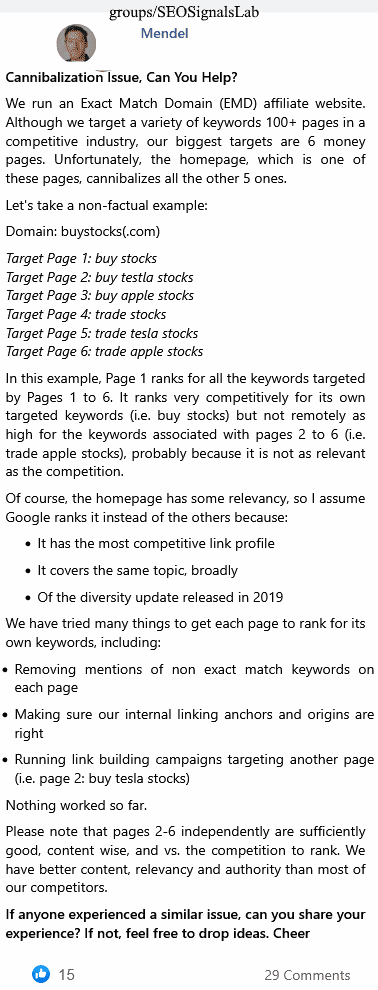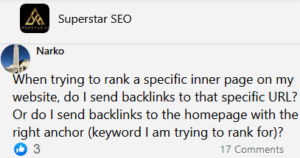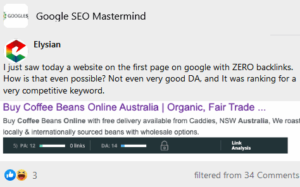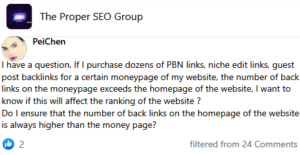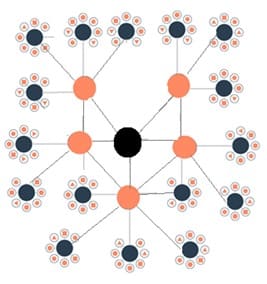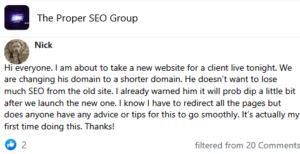Mendel
Cannibalization Issue, Can You Help?
We run an Exact Match Domain (EMD) affiliate website. Although we target a variety of keywords 100+ pages in a competitive industry, our biggest targets are 6 money pages. Unfortunately, the homepage, which is one of these pages, cannibalizes all the other 5 ones.
Let's take a non-factual example:
Domain: buystocks(.com)
Target Page 1: buy stocks
Target Page 2: buy testla stocks
Target Page 3: buy apple stocks
Target Page 4: trade stocks
Target Page 5: trade tesla stocks
Target Page 6: trade apple stocks
In this example, Page 1 ranks for all the keywords targeted by Pages 1 to 6. It ranks very competitively for its own targeted keywords (i.e. buy stocks) but not remotely as high for the keywords associated with pages 2 to 6 (i.e. trade apple stocks), probably because it is not as relevant as the competition.
Of course, the homepage has some relevancy, so I assume Google ranks it instead of the others because:
It has the most competitive link profile
It covers the same topic, broadly
Of the diversity update released in <year>
We have tried many things to get each page to rank for its own keywords, including:
Removing mentions of non exact match keywords on each page
Making sure our internal linking anchors and origins are right
Running link building campaigns targeting another page (i.e. page 2: buy tesla stocks)
Nothing worked so far.
Please note that pages 2-6 independently are sufficiently good, content wise, and vs. the competition to rank. We have better content, relevancy and authority than most of our competitors.
If anyone experienced a similar issue, can you share your experience? If not, feel free to drop ideas. Cheer
15 👍🏽15
29 💬🗨
📰👈
Okay. First thing – there really isn't such thing as Keyword Cannibalization. There IS, on the other hand, something that sort of resembles Intent Cannibalization. The reason for this is that Google isn't really a "match the keywords" engine anymore. In some areas where the knowledge graph isn't built out very well, keywords are still a huge factor in ranking, but in areas where the knowledge graph is very robust – playing the keyword game just won't work. Many niches are covered but the BIG ones where the entire thing is fairly well built out are health/medicine, science (or at least popular sciences), Your Money or Your Life (YMYL), and of course, finance.
The problem above can be broken down into a couple of key factors. The first one is that buy, sell, and trade in stock terms roughly equate to the same thing. Buying and selling aren't the same but trading covers them both. So really, what you have here is the exact opposite of keyword cannibalization. Buy Stocks and Trade Stocks are really the same thing – but when Google looks at it, it sees that you have inexplicably separated them. But then when it analyzes things – it realizes that you're just playing the keyword game and the pages are, in fact, really amounting to serving the same intent – I want to buy, sell, or trade stocks. And so it's picking one of the pages – just as it would a duplicate content situation. This isn't exact match duplicate content, but it IS duplicate intent, purpose, and solution.
The next thing here is that the home page is taking a lot of the clout because, in this scenario, I'd have to assume that the WHOLE site is about buying and trading stocks – so dropping you on one of the inner pages doesn't "really" get you any closer to the goal as dropping you on the home page.
And when it comes to the specific apple or tesla pages… I'd have to guess here, but I'd be willing to wager that you can't actually directly buy apple or tesla stocks on those pages. Rather, they are likely pages that talk about those things, and you end up getting routed somewhere else (maybe even through the home page or a front door to the actual stock trading system). And so, those pages don't really meet the intent and by sending a person there – they are really no closer to their objective than if they were dumped in on any of those six pages or the home page – and quite possibly, the home page is actually a step or two closer to the final goal than those pages.
This is just a low level assessment based upon a fictitious scenario that you set up – so it won't likely be exactly right when you apply this to your own scenario – but it'll be close. To remedy this, you need to stop thinking about keywords and start thinking about Semantic SEO, proper information architecture, and buyer journeys. With knowledge in those areas you'll understand that the best page for the search term "Buy Stocks" is NOT the page that uses that phrase the most. It is the page that is or is closest to the part of the site that actually lets you "buy stocks".
👍🏽28
My example was misleading. We could use these keywords instead as they would be more representative of our situation:
Target Page 1: best sites to buy stocks
Target Page 2: best sites to buy testla stocks
Target Page 3: best sites to buy apple stocks
Target Page 4: best sites to trade stocks
Target Page 5: best sites to trade tesla stocks
Target Page 6: best sites to trade apple stocks
In this case (which is similar to our situation), reviews sites rank at the top, always.
Peterson » Truslow
Keeping with the knowledge graph and entity concept. Let's say it's well built out for widgets and blue widgets, but not green widgets. All are types of the same widget but green are different such not to be a interchangeable. So green widget searches are showing blue widgets and even highlights blue widget in the Search Engine Result Page (SERP) snippets.
Have you come across ways to train Google that these things are actually different? We went back and forth on this in a previous thread but was checking some of my keywords today and noticed this lovely behavior.
Would you need to build out the graph stating from what Google seems to understand (blue widgets) and the link out to the other types to expand from there?
In my case if I run same of the searches with double quotes it does pickup my content. Newer site in an "authoritative space" so I'm assuming time is partially a facto with full indexing/keywording.
I also ask because I wonder if some is the same is happening with the OP's post depending on the actual topic.
Truslow 🎓
When it comes to products – it's a bit easier, unless you are the only site on the web with the product. Google learns a lot faster and gets things more accurate if there is corroborating evidence out there.
As for the false positives on the negative (i.e. You sell blue widgets, but not green ones yet Google is sending green widget traffic to you) it can be tricky. I've had a few clients where I've spent hours (and hours) trying to see where Google is getting it wrong. Sometimes it's a lack of understanding and completeness is that neighborhood of the knowledge graph. And other times it seems to come down to the fact that on most other sites, if they sell blue widgets, they also sell green widgets. So Google (wrongly) assumes that you must be too – it just can't quite get the right signals for you. Quite often, though, I can find some sort of confusing or misleading signal – like never mentioning green widgets, but mentioning that blue widgets look great when you install them in your green yard. (There was a similar example of this – since fixed – about six months ago where two mushrooms that are very similar in appearance had a statement on the page that said – and I forget the exact names so I'll bracket them – "<edible> mushrooms, not to be confused with <poisonous> mushrooms, are safe to eat." It then went on to tell you how to identify and tell them apart and all that fun stuff. But, when you asked Google if <poisonous> mushrooms were edible, Google came back with a featured snippet that didn't list the whole sentence. It just came back with a "Yes. <Poisonous> Mushrooms are safe to eat" and it sourced that page.
When it comes to building out the graph from your side… Yes – making connections is exactly how you want to do it. Here's an example I like to use when doing a coaching session on this…
Let's say you created a new brand of pain reliever called "Cylenol" and it's basically Tylenol with organic binders or whatever. Now… you want to promote your product as being able to cure headaches and minor aches and pains.
For Google – this is a tough connection to make. It doesn't know what Cylenol is so it can't make a call as to the accuracy. Accuracy isn't always important, but in some niches (like medical and YMYL where this product lives) it is.
So we need to make some connections. Our active ingredient is Acetaminophen. And Google knows what that is. But another problem here is that Acetaminophen is not known or proven to "cure" or even "eliminate" headaches. The science says that it can help treat those things – but saying "cure" is going to cause some dissonance.
From here we start making the connections.
Cylenol contains the active ingredient Acetaminophen.
Acetaminophen is used to help treat headaches and other mild aches and pains.
Now from this, Google can make the connection that Cylenol helps treat headaches. Without drawing those lines – it's difficult to nudge the knowledge graph.
NOTE: I find it works best, especially if your brand/product isn't already well established and understood, to keep those as two separate sentences each with a single triple. Google understands the two statements on their own, but can get confused if you try to say, "Cylenol contains Acetaminophen which is used to help treat headaches and other mild aches and pains." And really the whole thing would be better with a bullet list of the things Acetaminophen treats. So you'd for the single thing:
Acetaminophen Treats:
– Headaches
– Mild aches and pains
– Fever
– Whatever else.
And yeah – you are correct in that something else could very well be happening with the OPs actual situation. It's always a bit different. When I take on a new client, I'll often spend many hours not only learning about the things they do and their niche – but also in how Google understands that niche (or doesn't understand it, as the case may be). I make special note of areas where Google is starting to make connections that aren't quite accurate because I need to make sure I send EXTREMELY clear signals in those spots lest Google starts to get even more confused about it OR it just decides to not really put anything we say about that into the mix because it is just making it harder to figure this out.
As such, knowing the problem in any specific way comes from knowing what Google knows (or thinks it knows) and also knowing what Google doesn't know about the things you're trying to connect yourself to. And the specific solution is different every single time.
💟👍🏽7
Peterson » Truslow
Thanks. Interesting things to think about there. I've seen this happen with "new" product models/versions. The example I'm fiddling with isn't new but less focused on so specifically I can see where the issue is probably coming from.
Truslow 🎓
You might try creating a blog post or page that is a sort of "How to Choose Between a Blue Widget or a Green Widget".
Then create a table (with proper th headings and all that so it becomes something Google can analyze as data). That table would highlight the common features and the differentiating factors between the two. This way – Google can look at the two entities it's confusing head-to-head (as can your site visitors who may be having similar confusion if the Green Widget isn't well known) and see exactly what is the same and what is different between them.
Mendel ✍️ » Truslow
Hey, thanks for your answer, appreciate you taking so much of your time. I realize the fictive examples I provided aren't descriptive enough of our situation.
Despite this fact, you got one answer right; Out of the 6 pages, we can group them into 3 categories of 2 pages, where these pages serve very similar answers for each category. As a result, it would make sense that Google picks only 3 pages (representing different "intents") out of the 6.
However the second issue is not related to our site not allowing to actually "buy stocks". This is where my examples didn't work; we are an affiliate site and I should have given as an example "best sites to buy stocks" to not mislead you.
Let's put a more abstract example and assume we have published the 6 following pages:
Page X1
Page X2
Page Y1
Page Y2
Page Z1
Page Z2
Where both letters and numbers are variations of 2 different dimensions.
If I search for X1 and X2 on Google, I find largely similar results on Search Engine Result Page (SERP). The top 10 is represented by 8 same pages and 2 different pages. There are also variations in the ranking amongst the 8 same pages. This mostly confirms that Google sees all variations of X (1, 2, 3 …) as covering the same intent.
However, if I search X1, Y1 and Z1 on Google, despite being a clear correlation between the terms X, Y and Z, the top 10 is represented by 8 different results and 2 same results. As a matter of fact, these 2 same results are both represented by high authority parasite SEO guest posts mixing up the terms X, Y and Z as if they were the same (to rank for as many keywords as possible).
This to me seems to confirm that Google, despite the correlation between these terms, considers X, Y and Z as different topics serving different intents.
Another evidence that I have on the above is that we are targeting the exact same topics with another website we run. For this site, we published the following pages:
Page1 covering X1+X2
Page2 covering Y1+Y2
Page3 covering Z1+Z2
This other website managed to rank for the 6 categories of searches represented by the 3 intents described above (X1 and X2 for X, Y1 and Y2 for Y, Z1 and Z2 for Z). Actually, it ranks much more competitively for Y and Z than the other website for which we only rank the homepage.
Therefore, we still have an issue with website I mentioned in my initial post, as we should be able to rank for each of these intents independently, but our homepage just ranks for them all. Remember, this is an issue because although it ranks super competitively for X, it doesn't rank well for Y and Z (i.e. position 40, 80, etc.)
Do you have any other idea as to why this issue may happen?
Truslow 🎓
I haven't really learned much from your modifying the example – it went from something fictitious but tangible that I could analyze to something fictitious and with no context. Not sure there's anything I could add without knowing the specifics. Sorry.
Mendel ✍️ » Truslow
Direct Message (DM)'ed you in case you want the real information.
📰👈
Dale
Define: "internal linking anchors and origins are right." I ask, because a lot of the time people think it's done right, but it's not.
Fair question. It's true that I should question what I think we do right.
Basically, using the initial examples I provided (I updated the examples in one of my comments), this is what we've done: we have considered two dimensions, let's say X (buy), Y (trade), Z (sell) and 1 (all stocks), 2 (tesla), 3 (apple) etc. and linked between each dimensions whenever there is a match with the page. For example:
– Page X1 links to: X2, X3, X4 … | Y1, Z1 b
– Page Y3 links to Y1, Y2, Y4 … | X3, Z3
We standardized internal linking, therefore all anchors are always optimized to the relevant "matching dimension".
For example, for page X1, we use the anchor "2" when linking to page X2, "3" when linking to page X3, "Y" when linking to page "Y1", "Z" when linking to page Z1 …
I hope that makes sense!
Lastly, we made sure that the most important pages (including the 6 pages from my original post) are accessible from the header navigation and that these pages are amongst those receiving the most internal links from our other pages.
Let me know if you have further questions and, most importantly, if our internal linking strategy is missing an essential piece.
Dale » Mendel
Honestly, I have no idea what any of that means. Sorry man.
I'm getting the feeling though that something is off here. I know you are trying to be secretive, but it's made it difficult to give you advice. I can tell you that internal linking definitely isn't that complicated though. I feel like you're overthinking it.
Are your internal links all under corresponding h2 headers? Feel free to PM me for more info if you want it.
Dale » Mendel
Here's another question: how are you choosing the pages you have to internally link to your most important pages?
Mendel ✍️ » Dale
It is true that I am super secretive and it doesn't help. My apologies. I am definitely over complicating the examples by abstracting them (X, Y, Z, etc.) but I believe this last one is understandable 🙂 Anyway will Direct Message (DM) you
Dale » Mendel
Thanks bro
📰👈
Thoughts on Keyword Cannibalization in Search Engine Optimization (SEO)
Some Pages Are Ranking for the Same Keyword | Internal Linking Others to the Most Satisfying Page | Keyword Cannibalization
More Articles = More Chances of Ranking for Keywords = More Traffic? SEO
